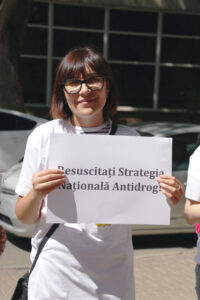Interviews with Member Representatives
Initiativa Pozitiva – Moldova
Website: www.positivepeople.md
Ina Vutcariov (Position: Head of the Section Activities for People in Conflict with the Law)
- Why is important for Initiativa Pozitiva to be part of the EFTC?
Initiativa Pozitiva has been carrying out rehabilitation programs for more than 20 years. Belonging to a community of professionals and the support of colleagues from different countries is for us a value and a benefit in itself. And the fact that we are part of EFTC makes us feel confident about the quality of our programs and our role in the rehabilitation segment.
- What are the main challenges Moldova is facing in the field of drugs and addictions?
Moldova has a severe deficit of state-funded rehabilitation programs; it has no rehabilitation programs for children and adolescents. Another difficulty is related to new psychoactive substances, which do not have an elaborate intervention and support protocol.
3. How is your organization helping to address these challenges?
The organization initiated advocacy actions regarding the financing of rehabilitation programs from state funds, and obtained funding from the municipal fund. The organization is also part of the working groups on legislative changes and the development of services for addicted people, which are organized at the level of parliament.
- How is the Therapeutic Community approach evolving in your country?
The impact of investing in treatment rather than punishment is increasingly understood. It promotes the idea that therapeutic communities are an effective method. An important step was the opening, 5 years ago, of the first TC in the penitentiary system.
De Kiem – Belgium
Website: www.dekiem.be
Dirk Vandevelde (Position: CEO of De Kiem)

- Why is important for De Kiem to be part of the EFTC?
Through an active membership of the EFTC, DE Kiem is part of a broader family of TC’s for people with addiction problems. The EFTC creates a unique opportunity to share experiences and training opportunities. The link with EWODOR gives the opportunity to get access to scientific research on the treatment model of the Therapeutic Community. Through the EFTC I got the change to meet and discuss with inspiring persons working with drug addicts, such as Don Ottenberg, George De Leon, Mario Picci, Naya Arbitter, Rowdy Yates, Anthony Slater, and many others. As member of the EFTC Board it’s a privilege for me to work together with colleagues form different other TC’s.
- What are the main challenges Belgium is facing in the field of drugs and addictions?
The number of people with a drug addiction is growing. Most treatment centres are confronted with waiting lists. The easy access to any sort of drugs (including new designer drugs) is a huge problem.
- How is your organization helping to address these challenges?
De Kiem started as a small TC (15 beds) for drug addicts in 1976. Now we have a ‘welcome house’, a TC with 25 beds, a program for women/men with children an a re-entry house (14 beds). Next to the residential programs we also developed out-patient treatment in 5 cities and we are running small programs in 7 prisons. We also work around drug prevention in different communities. We developed an evidence based treatment program for cocaine users.
- How is the Therapeutic Community approach evolving in your country?
The 6 TC’s in Belgium are all doing well. Since this year we welcomed a new TC which will focus especially on drug addicts who are also intellectually limited. We come together on a regular base and are gathered in an umbrella association when it comes to consulting with the government. Together the Flemish TC’s run a monthly ‘’women’s only reunion “ to support the women in the different TC’s. Mostly women are underrepresented in the TC’s. Also much work is done concerning trauma processing.
- What inspired you to do work in the field of drugs and addictions?
When I was a student at the University of Ghent, Faculty of Special Education, I met Professor Eric Broekaert. He was the founder of TC De Kiem, The first therapeutic community for people addicted to drugs in Belgium. He convinced me to focus on drug addiction during my studies. I went for training to The Netherlands in the TC ‘Parkweg buiten’, a subdivision of the Jellinek clinic. The year after that I followed a traineeship in De Kiem. After my studies I worked a couple of years in a different field of work until I was asked to come to work at De Kiem. Since 1992 I am in charge as CEO.
Associació d’Acollida i Acció Terapèutica (AAT) – Spain
Website: https://www.aat.cat/
Mercè Mompin (Director)
1. Why is important for AAT to be part of the EFTC?
Since the very beginning – Foundation of the entity – we believe that collaborate with other entities (federative work) is essential in order to share concerns and gain new perspectives with the programs we already have and the ones that can be developed. Our daily work is very demanding and it requires lots of “mental space”, having these exchanges with other entities is fundamental in order to adapt our professional response and projects to the current reality of addiction field.
2. What are the main challenges Spain is facing in the field of drugs and addictions?
In my opinion, one of the biggest challenges is the implementation of effective and early prevention measures regarding problematic drug abuse and behavioural disorders, until today treatments have been more focused on solving the issue when the abuse is already evident. I also believe that we have a huge deficit in specific services aimed at Young adults and adolescents. And, last but not least, families, who are normally not considered as an essential part of the drug abuse treatments, for us it is fundamental to work with families with an individual and communitarian perspective.
3. How is your organization helping to address these challenges?
Regarding prevention, we organise events in schools and high schools, we would like to develop our prevention program further and give it more strength to have a bigger impact. About the specific services for adolescents and Young adults it´s one of our biggest challenges because there are only few individuals that arrive to our facilities and normally they are handled individually (psychologic and educational support). Finally, regarding families, we are developing a project that works with families in different axis: individual support and working groups with professional guidance.
4. How is the Therapeutic Community approach evolving in your country?
In my opinion, Therapeutic Communities methodology is adapting and evolving to new realities and profiles: it’s not anymore a closed and isolated concept, treatments are longer and they include gender perspective. Despite the fact that we are evolving, sometimes I have the feeling that authorities consider it obsolete and not very efficient since it has a very high cost. The expectation is that CT treatment is a successful one without understanding that, in fact, the CT has a therapeutic and educative mission due to the intensity of its intervention, but it’s a long journey with ups and downs, inherent to the treatment and the individual process itself.
5. What inspired you to do work in the field of drugs and addictions?
During the 80’s, while I was an adolescent, I lived very closely the issue with heroin and I was shocked about how much people consuming and their families were suffering. When I started studying for being a social worker, I had made already my mind of working on the drug abuse field. So during year 1988, when I finished my degree, I started working in a therapeutical comunity on the rural area in Catalunya, it was a very intense and touching experience. Today, after 36 years working for the same entity (first as educational suport, then as social worker and now a days as the manager of the entity) I’m still touched by their surviving stories of fighting and surviving.


